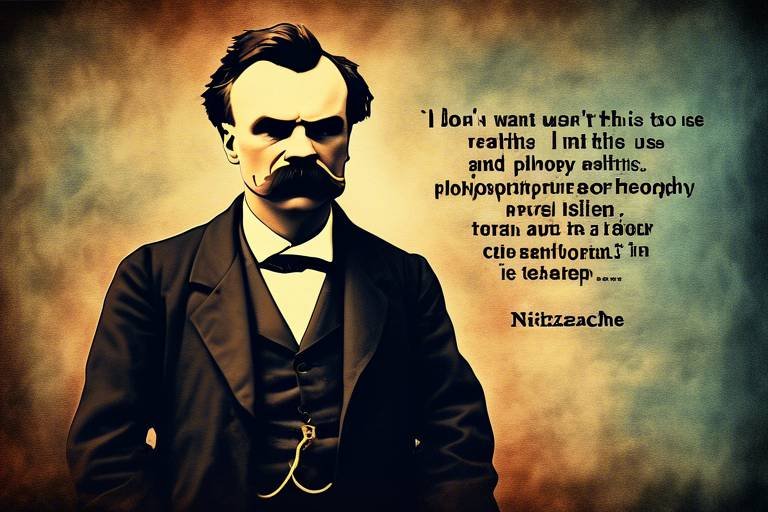The Philosophical Impact on Modern Medicine
The intersection of philosophy and medicine is a fascinating realm that shapes how we understand health, illness, and the very essence of care. Philosophy isn't just an abstract concept; it profoundly influences the **decisions** we make in healthcare every day. In modern medicine, philosophical principles guide healthcare professionals in their pursuit of knowledge, ethics, and patient-centered care. Imagine walking into a hospital where every decision made by doctors is not only based on the latest scientific data but also rooted in a deep understanding of human dignity and moral responsibility. This is the philosophical impact on modern medicine, where theory meets practice in the most profound ways.
At the heart of this relationship lies a fundamental question: What does it mean to be healthy? This question isn't merely medical; it's philosophical. The way we define health and illness influences how we approach treatment and care. For instance, while traditional medicine often focuses on the physical aspects of health, a philosophical perspective encourages a more holistic view, considering emotional and spiritual well-being as integral components of a person's overall health. This shift in perspective can lead to more comprehensive treatment plans that resonate with patients on multiple levels.
Moreover, the principles of ethics permeate every facet of medical practice. They serve as a moral compass, guiding healthcare professionals through the murky waters of patient care. Ethical considerations ensure that patients are treated with **dignity** and respect, fostering an environment where their voices are heard and valued. This is particularly important in a world where medical decisions can have life-altering consequences. By grounding their practice in ethical philosophy, healthcare providers can navigate complex situations with compassion and integrity, ultimately enhancing patient trust and outcomes.
As we delve deeper into the philosophical underpinnings of modern medicine, we uncover the role of critical thinking. This skill is essential for healthcare professionals, enabling them to analyze intricate cases, assess the validity of evidence, and make informed choices that prioritize patient welfare. In this way, philosophy becomes a tool that sharpens our ability to think deeply and critically about the choices we make in healthcare settings.
In summary, the philosophical impact on modern medicine is profound and multifaceted. It shapes our understanding of health, informs ethical practices, and enhances the quality of patient care. By embracing philosophical principles, we can create a healthcare system that not only treats symptoms but also nurtures the whole person. This holistic approach is what makes modern medicine not just a science, but an art that respects the complexities of human experience.
- How does philosophy influence medical ethics? Philosophy provides the foundational principles that guide ethical decision-making in healthcare, ensuring respect for patient autonomy and dignity.
- What is the role of critical thinking in medicine? Critical thinking allows healthcare professionals to analyze complex cases, evaluate evidence, and make informed decisions that prioritize patient welfare.
- What does holistic medicine entail? Holistic medicine emphasizes treating the whole person, integrating physical, emotional, and spiritual aspects of health.
- How does the mind-body connection affect health? The mind-body connection highlights the interplay between mental and physical health, encouraging a comprehensive understanding of patient well-being.
- What is integrative medicine? Integrative medicine combines conventional and alternative therapies, recognizing the value of diverse healing modalities in patient care.

The Role of Ethics in Medicine
Ethics serves as a cornerstone in medical practice, guiding healthcare professionals in making moral decisions that affect patient care and treatment outcomes. At its core, medical ethics revolves around four fundamental principles: **autonomy**, **beneficence**, **non-maleficence**, and **justice**. These principles are not just theoretical concepts; they are practical tools that help physicians navigate the often murky waters of patient care.
Let’s break it down a bit. **Autonomy** respects the patient's right to make informed decisions about their own health. This means that healthcare providers must ensure that patients have all the necessary information to make choices that align with their values and preferences. Imagine being in a restaurant where the waiter only tells you about the dishes he likes; you wouldn’t feel comfortable ordering, right? Similarly, patients need to be fully informed to make choices about their treatment.
Next up is **beneficence**, which is all about doing good. Healthcare professionals are expected to act in the best interest of their patients, providing treatments that are beneficial and effective. This principle is closely tied to **non-maleficence**, which means "do no harm." It’s a delicate balancing act; sometimes, what is beneficial may also have potential risks. For instance, a surgery might save a life but comes with significant risks. Here, the physician must weigh the pros and cons carefully.
Finally, we have **justice**, which focuses on fairness and equality in healthcare. It’s vital that all patients receive equitable treatment, regardless of their background, financial status, or other factors. This principle underscores the importance of addressing social determinants of health and striving for a healthcare system that serves everyone fairly.
In modern medicine, ethical dilemmas are commonplace. Consider the case of a terminally ill patient who wishes to pursue experimental treatment. Should the physician respect the patient’s autonomy, even if the treatment is unlikely to be beneficial? This is where the intricate dance of ethics comes into play. Healthcare providers must engage in thoughtful discussions with their patients, exploring their values and preferences while also providing professional guidance.
Moreover, ethical considerations extend beyond individual patient interactions. They also impact broader healthcare policies and practices. For instance, during public health crises, such as the COVID-19 pandemic, ethical questions about resource allocation, vaccine distribution, and public health mandates arise. Healthcare professionals must grapple with these issues, often under intense scrutiny and pressure.
In light of these complexities, many healthcare institutions now emphasize the importance of ethics education in medical training. By instilling a strong ethical foundation in future healthcare providers, we can ensure that they are well-equipped to handle the myriad challenges they will face in their careers. This training often includes case studies, role-playing scenarios, and discussions about real-life ethical dilemmas, all aimed at fostering critical thinking and ethical reasoning.
In conclusion, the role of ethics in medicine cannot be overstated. It is the guiding light that helps healthcare professionals navigate the intricate landscape of patient care. By prioritizing ethical principles, we can enhance the quality of care provided and ensure that patients feel respected, valued, and understood. After all, a healthcare system that places ethics at its core is not just about treating illnesses; it’s about caring for people.
- What are the main principles of medical ethics? The four main principles are autonomy, beneficence, non-maleficence, and justice.
- How do ethics influence medical decision-making? Ethics guide healthcare professionals in making choices that respect patient rights and promote well-being.
- Why is ethics education important for healthcare providers? It prepares them to handle complex ethical dilemmas and fosters critical thinking skills.

Philosophy of Science in Medicine
The philosophy of science plays a pivotal role in shaping the landscape of modern medicine. It provides the foundational frameworks that inform how medical professionals understand and engage with the complexities of health and illness. By delving into the methodologies and epistemologies that underpin medical research, we can better appreciate the nature of medical knowledge, its application in practice, and the ethical implications that arise from it.
At its core, the philosophy of science encourages healthcare professionals to ask critical questions about what constitutes valid knowledge and how it can be effectively applied to patient care. For instance, consider the difference between anecdotal evidence and rigorous scientific research. While personal stories can be compelling, they often lack the systematic approach that empirical studies provide. This is where the philosophy of science becomes essential, guiding practitioners in distinguishing between various forms of evidence and their relevance to clinical practice.
One significant aspect of this philosophical inquiry is the concept of evidence-based medicine. This approach integrates the best available research with clinical expertise and patient values, ensuring that healthcare decisions are informed by rigorous scientific inquiry. The emphasis here is not merely on following protocols but understanding the underlying principles that justify these practices. Evidence-based medicine has transformed the way treatments are administered, making it imperative for healthcare professionals to stay updated with the latest research findings.
Evidence-based medicine is more than just a buzzword; it represents a paradigm shift in how healthcare is delivered. By utilizing a structured approach to clinical decision-making, it prioritizes patient welfare and outcomes. This approach can be broken down into several key components:
- Best Available Evidence: This refers to the most current and relevant research findings that inform treatment protocols.
- Clinical Expertise: The skills and knowledge that healthcare professionals bring to the table, which are essential for interpreting evidence and applying it appropriately.
- Patient Values: Understanding the preferences and unique circumstances of patients ensures that care is tailored to individual needs.
By synthesizing these elements, healthcare providers can make informed decisions that enhance treatment efficacy and patient satisfaction. Furthermore, the philosophy of science encourages a culture of continuous learning, urging practitioners to remain curious and skeptical, always questioning the status quo in pursuit of better health outcomes.
Clinical guidelines, which are often derived from philosophical principles, play a crucial role in standardizing care. These guidelines provide evidence-based recommendations that ensure consistency and quality in treatment across diverse healthcare settings. They serve as a bridge between theoretical knowledge and practical application, helping to align the objectives of healthcare professionals with the needs of their patients.
However, it's essential to recognize that while guidelines are beneficial, they should not be viewed as rigid rules. The philosophy of science advocates for a flexible approach, allowing healthcare providers to adapt guidelines based on the specific context of each patient. This adaptability is vital in fostering a patient-centered approach to care.
Philosophical approaches to patient-centered care emphasize the importance of understanding patients' unique perspectives, values, and experiences. This fosters a collaborative relationship between healthcare providers and patients, where both parties engage in open dialogue about treatment options. The philosophy of science encourages practitioners to consider not just the biological aspects of health but also the psychological and social factors that influence well-being.
In conclusion, the philosophy of science is not merely an academic pursuit; it profoundly influences how medicine is practiced today. By embracing its principles, healthcare professionals can enhance their understanding of medical knowledge, improve patient outcomes, and navigate the ethical complexities of their work.
- What is the philosophy of science in medicine? - It refers to the study of the foundational principles that guide medical research and practice.
- How does evidence-based medicine differ from traditional practices? - Evidence-based medicine relies on the best available research and integrates it with clinical expertise and patient values for informed decision-making.
- Why are clinical guidelines important? - They provide standardized care recommendations, ensuring consistency and quality across various healthcare settings.
- What is patient-centered care? - It is an approach that emphasizes understanding patients' unique perspectives and fostering collaboration between healthcare providers and patients.

Evidence-Based Medicine
Evidence-Based Medicine (EBM) is not just a buzzword in the healthcare industry; it’s a revolutionary approach that merges clinical expertise with the best available research evidence. Imagine a world where medical decisions are not based on hunches or outdated practices but on rigorous scientific inquiry. This is what EBM aims to achieve, and it’s transforming the way healthcare professionals approach patient care.
At its core, EBM emphasizes the importance of integrating individual clinical expertise with the most relevant and up-to-date research. This means that when a doctor is faced with a treatment decision, they are not only relying on their own experience but also on a wealth of evidence gathered from studies and trials. This dual approach ensures that the treatments provided are both effective and tailored to the unique needs of each patient.
One of the key aspects of EBM is its focus on patient values and preferences. In other words, it acknowledges that patients are not just passive recipients of care; they are active participants in their health journey. This shift in perspective is crucial because it fosters a collaborative relationship between healthcare providers and patients. When patients feel heard and valued, they are more likely to engage in their treatment plans, leading to better health outcomes.
To illustrate how EBM works in practice, consider the following table that summarizes the key components of Evidence-Based Medicine:
| Component | Description |
|---|---|
| Clinical Expertise | The skills and past experiences of healthcare providers in diagnosing and treating patients. |
| Best Available Evidence | Research findings from high-quality studies that inform clinical decisions. |
| Patient Values | The preferences, concerns, and expectations of patients regarding their care. |
In summary, Evidence-Based Medicine is a powerful framework that champions a more informed and collaborative approach to healthcare. By blending clinical expertise, the best available evidence, and patient values, EBM not only enhances treatment effectiveness but also enriches the patient experience. It’s a win-win situation where both healthcare providers and patients are empowered to make informed decisions together.
As we navigate the complexities of modern medicine, embracing EBM is essential for improving patient outcomes and ensuring that healthcare remains a patient-centered endeavor. So, the next time you visit a healthcare provider, remember that your input and preferences are just as important as the evidence that guides their decisions.

Clinical Guidelines and Protocols
Clinical guidelines and protocols represent the backbone of modern medical practice, serving as essential tools that guide healthcare professionals in delivering high-quality care. These guidelines are not arbitrary; they are meticulously developed based on rigorous research, expert consensus, and philosophical principles that emphasize the importance of evidence-based practice. Imagine a vast library filled with books of knowledge; clinical guidelines are like the index that helps you navigate through this wealth of information, ensuring that you find the most relevant and reliable resources for patient care.
One of the primary purposes of clinical guidelines is to standardize treatment across various healthcare settings. This standardization is crucial because it helps eliminate variations in care that can arise from differing levels of expertise, resources, or even personal biases of healthcare providers. By adhering to established protocols, clinicians can ensure that every patient receives consistent treatment, regardless of where they seek care. This consistency not only enhances the quality of care but also builds trust between patients and healthcare providers.
Furthermore, clinical guidelines incorporate a wide array of factors, including patient demographics, clinical conditions, and emerging research findings. For example, when treating conditions like diabetes or hypertension, guidelines will often outline specific protocols that take into account the latest research on medication effectiveness, potential side effects, and even lifestyle interventions. This comprehensive approach allows healthcare professionals to tailor their treatment plans to the individual needs of patients, ultimately leading to better health outcomes.
To illustrate the significance of clinical guidelines, let’s take a closer look at how they are developed. Typically, a panel of experts in a specific field will gather to review the current literature, analyze data, and discuss best practices. This collaborative effort is guided by philosophical underpinnings that prioritize patient welfare, ethical considerations, and the importance of informed consent. The result is a set of guidelines that not only reflects scientific evidence but also aligns with the values and preferences of patients.
In addition to improving patient outcomes, clinical guidelines also play a vital role in the education and training of healthcare professionals. They serve as essential resources for medical students, residents, and practicing clinicians alike, providing a framework for understanding complex clinical scenarios. By familiarizing themselves with these guidelines, healthcare providers can enhance their critical thinking skills and improve their ability to make informed decisions in real-time, ultimately benefiting the patients they serve.
Moreover, it is important to recognize that clinical guidelines are not static; they evolve over time as new research emerges and healthcare practices change. This dynamic nature ensures that healthcare providers are always equipped with the most current information, allowing them to adapt their approaches as necessary. In this way, clinical guidelines act as living documents that continuously shape the landscape of modern medicine.
In summary, clinical guidelines and protocols are indispensable components of contemporary healthcare. They provide a structured approach to patient care that is rooted in evidence, ethical considerations, and the ever-evolving nature of medical knowledge. By adhering to these guidelines, healthcare professionals can ensure that they are making informed decisions that prioritize patient well-being, ultimately leading to improved health outcomes and a more effective healthcare system.
- What are clinical guidelines? Clinical guidelines are systematically developed statements that assist healthcare professionals in making decisions about appropriate health care for specific clinical circumstances.
- How are clinical guidelines created? They are developed by panels of experts who review current research, analyze data, and discuss best practices to create evidence-based recommendations.
- Why are clinical guidelines important? They standardize care, improve patient outcomes, and serve as educational resources for healthcare professionals.
- Are clinical guidelines static? No, they evolve over time based on new research and changes in healthcare practices.

Patient-Centered Care
In the evolving landscape of healthcare, has emerged as a vital philosophy that fundamentally shifts the dynamics between healthcare providers and patients. This approach emphasizes the importance of understanding patients as unique individuals rather than merely cases or diagnoses. Imagine walking into a doctor's office where your concerns are not just heard but truly valued—where your preferences, values, and experiences are integral to the treatment plan. This is the essence of patient-centered care.
At its core, patient-centered care fosters a collaborative relationship between healthcare professionals and patients. It encourages open communication, allowing patients to express their thoughts and feelings about their health. This two-way dialogue is crucial because it empowers patients, making them active participants in their own care. When patients feel heard and respected, they are more likely to adhere to treatment plans and engage in their health journey.
One of the key components of patient-centered care is the recognition that every patient comes with a unique set of experiences and expectations. For instance, consider a patient managing a chronic illness. Their journey is not just about the illness itself but also about how it affects their daily life, relationships, and emotional well-being. By taking the time to understand these factors, healthcare providers can tailor interventions that resonate with the patient's lifestyle and preferences.
Moreover, patient-centered care is closely aligned with the principles of shared decision-making. This process involves healthcare professionals and patients working together to make informed choices about treatment options. Instead of a one-size-fits-all approach, shared decision-making respects the patient's autonomy and acknowledges their right to make choices about their own health. This is especially important in situations where multiple treatment paths are available, as it allows patients to weigh the benefits and risks based on their values and goals.
In practice, implementing patient-centered care can take various forms. For example, healthcare facilities may utilize patient feedback systems to gather insights on the patient experience. This feedback can then be used to improve services, ensuring that care delivery aligns with patient needs. Additionally, training programs for healthcare providers often include modules on effective communication skills, helping them to foster a more empathetic and understanding environment.
As we look to the future of healthcare, it’s clear that patient-centered care will play a pivotal role in shaping medical practices. By prioritizing the patient experience, we can bridge the gap between clinical expertise and personal care, ultimately leading to better health outcomes. It’s not just about treating the illness; it’s about caring for the person.
- What is patient-centered care?
Patient-centered care is an approach that emphasizes the involvement of patients in their own healthcare decisions, focusing on their unique needs, preferences, and values. - How does patient-centered care improve health outcomes?
By fostering open communication and collaboration, patient-centered care leads to greater patient satisfaction, adherence to treatment plans, and ultimately, improved health outcomes. - What are some examples of patient-centered care?
Examples include shared decision-making, personalized treatment plans, and actively seeking patient feedback to enhance care delivery. - Why is patient-centered care important?
It respects patient autonomy, enhances the patient experience, and promotes better health outcomes by considering the whole person rather than just the illness.

Critical Thinking in Medical Practice
Critical thinking is not just a buzzword; it’s a vital skill for healthcare professionals that can make the difference between life and death. In the fast-paced world of medicine, where decisions often need to be made quickly, the ability to critically analyze information, weigh options, and foresee potential outcomes is essential. Think of it as being a detective in a world full of mysteries—every patient presents a unique case that requires careful consideration and an investigative mindset.
Healthcare providers are often faced with complex situations that demand more than just following protocols or relying on intuition. They must engage in a rigorous process of evaluation and analysis. This involves questioning assumptions, considering alternative explanations, and synthesizing information from various sources. For instance, when diagnosing a patient, a physician must not only look at the symptoms but also consider the patient's history, lifestyle, and even psychological state. This multi-faceted approach ensures a more accurate diagnosis and effective treatment plan.
Moreover, critical thinking fosters a culture of collaboration among healthcare teams. When professionals engage in open dialogue and share their insights, they can challenge each other's perspectives, leading to more comprehensive care. Imagine a team of doctors discussing a complicated case; each member brings their unique expertise to the table, creating a richer understanding of the patient’s condition. This collaborative critical thinking can improve patient outcomes significantly.
To illustrate the importance of critical thinking in medical practice, consider the following table that outlines key components and their impacts:
| Component | Impact on Patient Care |
|---|---|
| Analysis of Symptoms | Leads to accurate diagnosis and timely treatment. |
| Evaluating Evidence | Ensures that treatment plans are based on the best available research. |
| Considering Patient History | Helps in understanding underlying issues that may affect treatment. |
| Interdisciplinary Collaboration | Enhances comprehensive care through diverse perspectives. |
Additionally, critical thinking is essential for navigating ethical dilemmas in medicine. Healthcare providers often encounter situations where the right course of action isn’t clear-cut. In these moments, critical thinking allows them to weigh the ethical implications of their decisions, ensuring that patient welfare remains the top priority. It’s about asking the tough questions: What are the potential risks? How will this decision affect the patient’s quality of life? By fostering a habit of critical inquiry, healthcare professionals can uphold their commitment to ethical practice.
In summary, critical thinking in medical practice is akin to a compass guiding healthcare professionals through the complexities of patient care. It empowers them to make informed decisions, enhances collaboration among teams, and upholds ethical standards. As the medical field continues to evolve, the need for sharp critical thinking skills will only grow, making it an indispensable tool for anyone in the healthcare profession.
- What is critical thinking in medicine? Critical thinking in medicine refers to the ability to analyze information, evaluate evidence, and make informed decisions regarding patient care.
- Why is critical thinking important for healthcare professionals? It enhances decision-making, improves patient outcomes, and fosters ethical practices in complex situations.
- How can healthcare professionals improve their critical thinking skills? Through continuous education, engaging in interdisciplinary discussions, and reflecting on their clinical experiences.

Holistic Approaches to Health
In today's fast-paced world, the concept of holistic health has gained significant traction among both healthcare professionals and patients alike. But what does it truly mean to adopt a holistic approach to health? At its core, holistic medicine is about treating the whole person rather than merely addressing isolated symptoms. It integrates the physical, emotional, and spiritual aspects of health, recognizing that each component plays a crucial role in overall well-being. Imagine your health as a complex tapestry; if one thread frays, the entire piece can lose its integrity. This metaphor illustrates why a holistic perspective is essential in modern medicine.
Holistic approaches encourage healthcare providers to view patients as unique individuals with distinct needs, experiences, and values. For instance, when a patient presents with chronic pain, a holistic practitioner will not only assess the physical symptoms but will also explore emotional stressors, lifestyle choices, and even spiritual beliefs that may contribute to the condition. This comprehensive evaluation allows for a more tailored treatment plan that resonates with the patient's life context, fostering a deeper connection between the patient and the healthcare provider.
Moreover, the integration of holistic practices often leads to the incorporation of various therapeutic modalities. These can include traditional medical treatments alongside alternative therapies such as acupuncture, yoga, meditation, and nutritional counseling. By blending these diverse approaches, healthcare professionals can offer a more rounded and effective treatment plan. For example, a patient dealing with anxiety might benefit from both psychotherapy and mindfulness meditation, addressing the issue from multiple angles.
One of the most fascinating aspects of holistic health is the mind-body connection. This concept highlights how our mental state can significantly influence our physical health. Research has shown that psychological factors, such as stress and emotional well-being, can manifest as physical ailments. By acknowledging this connection, healthcare providers can better understand their patients' conditions and promote healing through both mental and physical interventions. For example, a patient suffering from insomnia may find relief not only through medication but also through cognitive-behavioral therapy and lifestyle adjustments.
In addition, the principles of holistic health advocate for preventive care. Rather than waiting for illnesses to arise, a holistic approach encourages individuals to actively engage in practices that promote long-term well-being. This can include regular exercise, balanced nutrition, and mindfulness practices. By prioritizing prevention, patients can enhance their quality of life and reduce the risk of chronic diseases.
Ultimately, embracing holistic approaches to health can lead to a more fulfilling and enriched life. It encourages patients to take an active role in their health journey, fostering a sense of empowerment and responsibility. As the healthcare landscape continues to evolve, integrating holistic principles into medical practice may pave the way for a more compassionate, effective, and patient-centered approach to health care.
- What is holistic health? Holistic health is an approach that considers the whole person—body, mind, and spirit—in the pursuit of optimal health and wellness.
- How does the mind-body connection affect health? The mind-body connection suggests that mental states can influence physical health, meaning emotional and psychological well-being are integral to overall health.
- Can holistic practices be integrated with conventional medicine? Yes, many healthcare providers combine holistic practices with conventional medicine to create comprehensive treatment plans that address multiple facets of health.
- What are some examples of holistic therapies? Examples include acupuncture, yoga, meditation, nutritional counseling, and aromatherapy, among others.

Mind-Body Connection
The is a fascinating concept that emphasizes the intricate relationship between our mental and physical health. Imagine your mind as a conductor of an orchestra, where each thought and emotion plays a vital role in the overall symphony of your well-being. When one section is out of tune, it can affect the entire performance. This analogy beautifully captures how our thoughts, feelings, and beliefs can influence our physical health, and vice versa.
Research has shown that stress, anxiety, and depression can manifest as physical symptoms, leading to conditions such as headaches, digestive issues, and even chronic pain. Conversely, physical ailments can also impact our mental state, creating a vicious cycle that can be challenging to break. For instance, someone suffering from chronic pain may experience feelings of hopelessness or frustration, which can exacerbate their pain. This interplay highlights the importance of considering both mental and physical aspects when diagnosing and treating patients.
Healthcare providers are increasingly recognizing the significance of this connection. By adopting a more holistic approach, they can better address the needs of their patients. Here are some key aspects of the mind-body connection that are gaining traction in modern medicine:
- Psychosomatic Medicine: This field studies how psychological factors can affect physical health, leading to better treatment options that address both mind and body.
- Mindfulness Practices: Techniques such as meditation and yoga are being integrated into treatment plans, helping patients manage stress and improve their overall health.
- Cognitive Behavioral Therapy (CBT): This therapeutic approach helps patients reframe negative thoughts, which can lead to improved physical health outcomes.
Furthermore, the incorporation of practices that promote mental well-being is vital in fostering a comprehensive understanding of health. For example, many healthcare professionals now encourage their patients to engage in activities that promote relaxation and emotional balance, such as journaling, art therapy, or spending time in nature. These practices not only enhance mental health but can also lead to improved physical health outcomes.
Ultimately, understanding the mind-body connection is essential for both healthcare providers and patients. It encourages a shift away from viewing health as merely the absence of disease, to a more integrated perspective that encompasses emotional, psychological, and physical well-being. As we continue to explore this connection, the potential for more effective and compassionate healthcare becomes increasingly evident.
- What is the mind-body connection?
The mind-body connection refers to the relationship between our mental processes and physical health, highlighting how thoughts and emotions can influence bodily functions. - How can I improve my mind-body connection?
Practices such as mindfulness, meditation, and engaging in physical activities can help strengthen the mind-body connection. - Why is the mind-body connection important in medicine?
Recognizing this connection allows healthcare providers to offer more holistic treatments that address both mental and physical health, leading to better patient outcomes.

Integrative Medicine
Integrative medicine is a fascinating approach that seeks to combine the best of both worlds—conventional medicine and alternative therapies. Imagine a bridge connecting two islands; on one side, you have traditional medical practices, and on the other, a variety of holistic healing methods. This concept is not merely about blending treatments; it's about fostering a comprehensive understanding of health that respects and incorporates the diverse needs of patients. By acknowledging the complexities of human health, integrative medicine offers a more personalized and effective approach to treatment.
At the heart of integrative medicine lies the belief that healing is not just about treating symptoms but about addressing the whole person. This philosophy encourages healthcare providers to look beyond the physical ailments and consider emotional, social, and spiritual factors that contribute to a patient's overall well-being. For instance, a patient dealing with chronic pain may benefit not only from medication but also from therapies such as acupuncture, mindfulness practices, or nutritional counseling. This multifaceted approach allows for a more tailored treatment plan that can lead to improved health outcomes.
Moreover, integrative medicine emphasizes the importance of patient empowerment. Patients are encouraged to take an active role in their health journey, making informed decisions about their treatment options. This collaborative relationship between healthcare providers and patients fosters trust and enhances the healing process. It’s like a dance where both partners must be in sync to create a beautiful performance. When patients feel heard and respected, they are more likely to engage in their care and adhere to treatment plans.
To illustrate the effectiveness of integrative medicine, consider the following table that highlights various integrative therapies and their potential benefits:
| Therapy | Potential Benefits |
|---|---|
| Acupuncture | Reduces pain, alleviates stress, and improves overall well-being. |
| Meditation | Enhances mental clarity, reduces anxiety, and promotes emotional health. |
| Nutritional Counseling | Improves diet, boosts energy levels, and supports immune function. |
| Yoga | Increases flexibility, reduces stress, and promotes mindfulness. |
As we move forward in the realm of healthcare, the integration of various healing modalities will likely become more prevalent. The ever-changing landscape of medicine calls for an open-minded approach that values the insights from both traditional and alternative practices. By embracing integrative medicine, we can create a more holistic healthcare system that prioritizes the individual needs of patients, ultimately leading to a healthier society.
- What is integrative medicine? Integrative medicine is a holistic approach to healthcare that combines conventional medical treatments with alternative therapies to address the whole person.
- How does integrative medicine benefit patients? It empowers patients to take an active role in their health, promotes a comprehensive understanding of their well-being, and often leads to better health outcomes.
- What types of therapies are included in integrative medicine? Common therapies include acupuncture, meditation, nutritional counseling, and yoga, among others.
- Is integrative medicine evidence-based? Yes, integrative medicine is grounded in scientific research and evidence-based practices while also valuing patient experiences and preferences.
Frequently Asked Questions
- How does philosophy influence modern medical practices?
Philosophy shapes modern medicine by providing ethical frameworks that guide healthcare professionals in their decision-making processes. It helps them navigate complex moral dilemmas, ensuring that patient autonomy and dignity are respected while promoting the best possible treatment outcomes.
- What is the role of ethics in patient care?
Ethics serves as a cornerstone in patient care, guiding healthcare providers to make moral decisions that prioritize the well-being of patients. By adhering to ethical principles, medical professionals can ensure that their actions are aligned with the values and needs of their patients, fostering trust and respect in the healthcare relationship.
- What is evidence-based medicine?
Evidence-based medicine integrates the best available research with clinical expertise and patient values. It emphasizes the importance of using rigorous scientific inquiry to inform healthcare decisions, ensuring that treatments are effective and tailored to individual patient needs.
- How do clinical guidelines impact medical practice?
Clinical guidelines, derived from philosophical principles, standardize care by providing evidence-based recommendations. This ensures consistency and quality in treatment across diverse healthcare settings, helping healthcare professionals deliver optimal care to their patients.
- What does patient-centered care mean?
Patient-centered care emphasizes understanding patients' unique perspectives, values, and experiences. It fosters a collaborative relationship between healthcare providers and patients, ensuring that treatment plans are aligned with what matters most to the individuals receiving care.
- Why is critical thinking important in medicine?
Critical thinking is essential for healthcare professionals as it enables them to analyze complex cases, evaluate evidence, and make informed decisions. This prioritizes patient welfare and ethical considerations, ensuring that care decisions are both thoughtful and responsible.
- What are holistic approaches to health?
Holistic approaches to health focus on treating the whole person, integrating physical, emotional, and spiritual aspects of well-being. This philosophy promotes overall health rather than merely addressing symptoms, encouraging a more comprehensive understanding of patient care.
- How does the mind-body connection affect health?
The mind-body connection highlights the interplay between mental and physical health. Recognizing this relationship encourages healthcare providers to consider psychological factors in diagnosis and treatment, leading to a more thorough understanding of patient health and wellness.
- What is integrative medicine?
Integrative medicine combines conventional and alternative therapies, guided by philosophical principles that advocate for a more inclusive approach to health. It recognizes the value of diverse healing modalities, allowing for personalized treatment plans that cater to the unique needs of each patient.



















